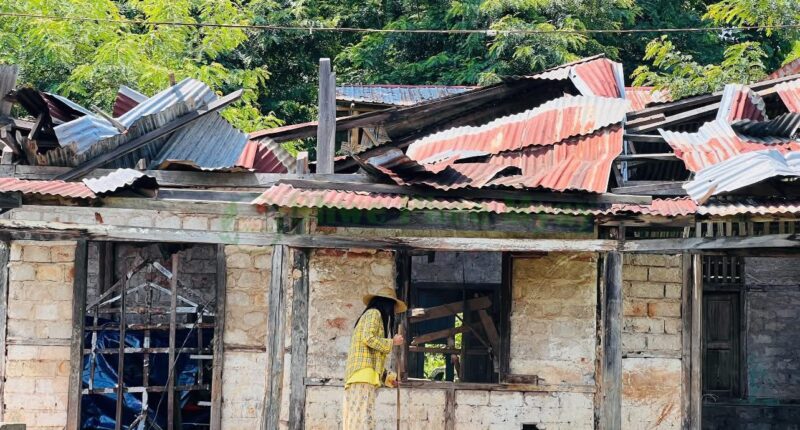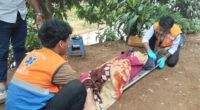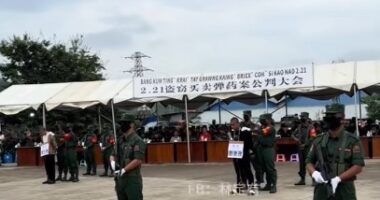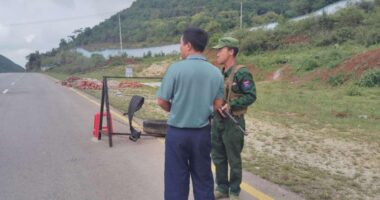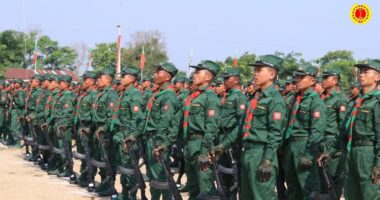By Mai A Naing, Shwe Phee Myay
The school in Manli village has opened ahead of schedule, even though the Ta’ang Land Education Council (TLEC) has not yet opened other schools in the Ta’ang region. This is driven by the teachers’ and residents’ deep dedication to the children’s education.
However, on June 12, the third day after the school opened, the junta’s military dropped bombs on the school and the adjacent monastery in Manli Village, Namtu Township, a Ta’ang National Liberation Army (TNLA)-controlled area.
“We will not repair this school until Min Aung Hlaing dies. And we will also no longer teach at this school. Regardless of how many times we repair it, they repeatedly come and bomb it,” said a teacher who has served at the school.
This is not the first time the junta has launched airstrikes on the school and monastery in Manli Village. They have conducted airstrikes in that village since 2023, with this latest being the third incident.
On December 29, 2023, a junta military fighter jet dropped bombs on the school and monastery in the village. Lway May Phyo, a teacher who had traveled from elsewhere to serve at the school, died from shrapnel injuries sustained in the bombing.
While the explosion’s power damaged numerous homes in the village, no other villagers sustained injuries. This was fortunate, as they were in nearby mountains and jungles engaged in hillside cultivation.
Following the attack, most villagers fled to other villages and nearby hillside cultivation sites, fearing further airstrikes. However, as the skies grew quiet, they returned to the village a week later. A few days after their return, on January 10, the junta’s military launched another airstrike on the school.
In late 2024, a few months after the incidents, villagers managed to repair the school and their houses at their own efforts, aiming to sustain their children’s education.
For the 2025-2026 academic year, villagers had planned to open their school as a Basic Education Middle School. However, recovery efforts have become much harder since the junta’s military launched a third airstrike on the village, again targeting the school and monastery. The wards in the monastery were also severely damaged.
In the early morning of June 12, while residents slept soundly, a junta military fighter jet dropped 300 lb bombs, once again destroying and burning down both the school and the monastery.
“The first time, they dropped the bomb on the school. Right after they dropped it, I knew it would come again, so I ran into the jungle behind the monastery. The novice monk sleeping inside the dining hall also followed me; otherwise, he could have been torn to pieces. All the wards in the monastery were destroyed,” said U Panna Wa, the abbot of Manli Village’s monastery.
At least 10 houses near the monastery were damaged by the force of the bomb’s explosion. However, no villagers were injured, as their past experience with airstrikes led them to flee quickly.
“After the first bomb dropped, everyone in the village suddenly woke up and cried. People reminded each other that it would return after reloading ammunition. Therefore, all residents came out of their houses and fled to safe places. Otherwise, some villagers could have sustained injuries,” the teacher recalled.
Manli has not only endured three junta airstrikes but was also attacked with arson during clashes between two ethnic armed groups in 2021.
In April 2021, fighting broke out around Manli between the Restoration Council of Shan State (RCSS) and the combined forces of the TNLA and Shan State Progress Party (SSPP). Amid these clashes, almost half of the village was burned down.
Since that time, villagers have encountered significant challenges in reconstructing their homes while simultaneously grappling with the broader hardships of living amidst ongoing conflict in the region.
Beyond the destruction of houses and buildings, villagers have also experienced the disappearance of family members. Some individuals were arrested by ethnic armed groups, and many have yet to be released.
Only moments after beginning to recover from these challenging circumstances, and while villagers harbored hopes of sustaining their children’s education, the junta’s military once more launched an aerial bombardment on the village, extinguishing all aspirations and bringing only tears.
In Manli village, after ethnic armed group clashes, the Buddhist community rebuilt their monastery, making it larger and more elaborate. Tragically, just three days after its grand opening, the junta’s military launched its inaugural airstrike on the village, incinerating the new monastery.
The village’s newly built houses were also damaged by the airstrike. After repeated destruction, villagers can no longer afford to rebuild their homes. Most now live in tents on their properties, beside their repeatedly damaged houses.
“I’m not rebuilding the house again. I’m very depressed and have no money to rebuild. I just spent 1.5 million kyats on repairs, and no sooner was it finished than this happened again. So, I’m just letting it be,” said Yar Aye Ngin, whose home in the village was damaged again by the June 12 airstrike.
Most Manli residents are now living in the nearby jungle, alongside their hillside cultivation farms. Some people are still living in their houses damaged by the airstrikes, covering them with waterproof sheets.
The junta’s repeated airstrikes left no room for Manli villagers to decide what they should do for their children’s education for the current academic year, as their recently rebuilt school has been destroyed again.
Translated by #KLT
You can read and listen to our Shwe Phee Myay’s reports, not only on Facebook and our Website, but also on the following channels:
